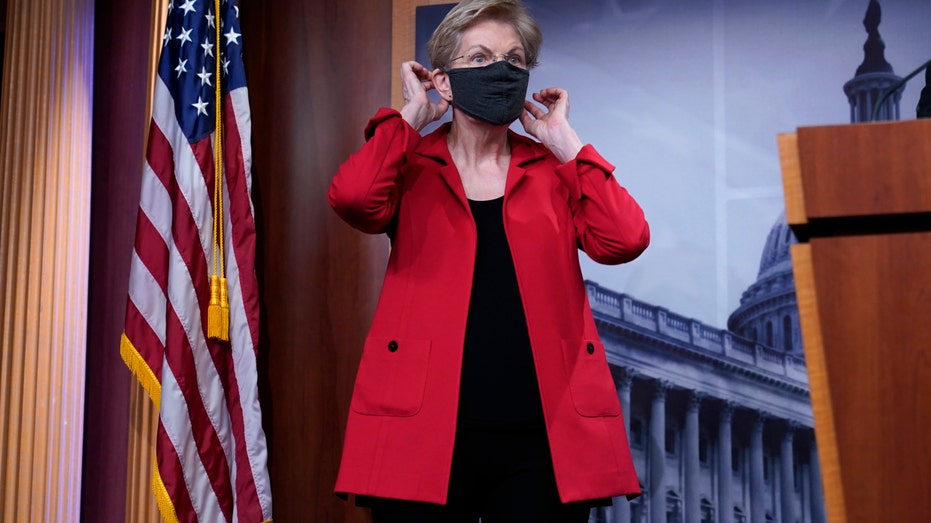Dems again urge Biden to cancel student loan debt as payment restart looms
18M borrowers could owe up to $85.48B annually once payments resume
Chief economist slams Biden's ideas to put student loans on hold
Brian Wesbury explains the potential consequences of the president's idea, and discusses how the administration is giving people incentives not to work on 'Making Money'
A group of Democrats is ramping up the pressure on President Biden to use his executive authority to cancel billions of dollars in student loan debt and extend a moratorium on payments that is poised to expire in February.
In a Wednesday letter addressed to the White House, Senate Majority Leader Chuck Schumer, D-N.Y.; Sen. Elizabeth Warren, D-Mass.; and Rep. Ayanna Pressley, D-Mass., warned that millions of families could be hurt financially and that the economy's recovery from the pandemic imperiled if Biden does not extend the federal government's pause on student loan payments, which is slated to end on Feb. 1, 2022.
The lawmakers cited an analysis conducted by the Roosevelt Institute, a progressive think tank, showing that resuming student-loan payments in less than two months will "strip" 18 million borrowers of $7.12 billion a month and $85.48 billion annually over the next year.
CANCELING STUDENT LOAN DEBT COULD BENEFIT WEALTHY AMERICANS THE MOST
The study examined 60% of the 43 million total borrowers in the U.S. affected by the payment pause, excluding the 7.7 million individuals who are behind on payments. Based on that data, there are roughly 18 million borrowers who – before the freeze on payments began – paid an average of $393 per month toward their loans.
"To prevent the student debt crisis from dragging down on our economic recovery, undermining the effectiveness of the American Rescue Plan, and causing unnecessary pain and stress for American families, we strongly urge you to extend the pause on student loan payments and interest and act to cancel student debt," they wrote in the letter.

Senate Majority Leader Chuck Schumer speaks to reporters after a Democratic policy meeting at the Capitol on Sept. 28, 2021. (AP Photo/J. Scott Applewhite / AP Newsroom)
Lawmakers have cited the additional uncertainty caused by the new omicron variant of COVID-19, which has been found in at least 57 countries, including the U.S.
There is still a lack of clarity over how dangerous the strain is, including whether it is more transmissible or capable of causing more severe illness. Early evidence suggests an increased risk of reinfection.
"If we don't extend the pause, interest rates just pile up. Students owe a fortune," Schumer said. "And with omicron here, we're not getting out of this as quickly as we'd like."
The Education Department has provided about $72 billion in relief on student loan interest alone, the lawmakers previously said. About 41 million Americans are benefiting from the federal government’s pause of student loan payments, which began in March 2020 and was twice extended.
Schumer, Warren and Pressley also called on Biden to cancel $50,000 in outstanding federal debt per borrower via executive order. The Democrats have maintained that Biden could use existing executive authority under the Higher Education Act to order the Department of Education to "modify, compromise, waive or release" student loans.

Sen. Elizabeth Warren puts on her mask after speaking at a news conference on Capitol Hill on March 1, 2021. (AP Photo/Susan Walsh)
They cited the Roosevelt Institute analysis, which estimated that wiping out $50,000 in federal debt per borrower would boost the nation's GDP by $173 billion in the first year the policy was implemented.
"The authors of this analysis are correct," the lawmakers wrote. "We strongly urge you to act without delay. In the meantime, we strongly urge you to extend the pause on student loan payments, interest and collections until the economy reaches pre-pandemic employment levels."
Such sweeping executive action by Biden would almost certainly face a legal challenge, and it's unclear whether it could survive. Critics have argued that using such power exceeds the president's authority granted by Congress.
GET FOX BUSINESS ON THE GO BY CLICKING HERE
Biden campaigned on canceling billions of dollars in student loan debt but has so far erased just a fraction of the pledged amount for about 72,000 borrowers, drawing ire from some progressive lawmakers who want him to move further left on the issue.
Outstanding student loan debt has doubled over the past decade, nearing a staggering $1.7 trillion. About one in six American adults owes money on federal student loan debt, which is the largest amount of non-mortgage debt in the U.S. It has been cited as a major hindrance in people’s "economic life" by Federal Reserve Chairman Jerome Powell.





















